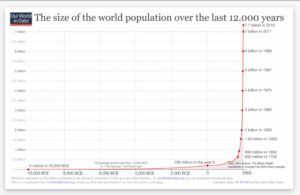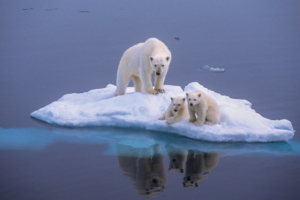Rapid Loss Of Most Non-Renewable Resources!
Forget Peak Oil. Refocus, on peak food, peak hunger, peak everything. The planet’s maxing out. Billions will go hungry. Every day. We’re poisoning our future. That’s why Cargill, America’s largest private food company, is warning us: about water, seeds, fertilizers, diseases, pesticides, droughts. You name it. Everything impacts the food supply. Wake up America, it’s worse than you think, soon too late.
Yes, we are slowly poisoning America’s food supply, poisoning the whole world’s food supply. Fortunately, Cargill is thinking ahead. Too bad our political leaders are dragging their feet. Trapped in denial, they blindly protect Big Oil donors, afraid of losing their job security. But their inaction is killing our future, starving, poisoning people, while they hide behind junk-science.
The honest-to-God truth is Big Ag’s worldwide farm production growth cannot feed the 10 billion who will be living on Planet-Earth by 2050. Worse, we can’t wait till 2050 for the fallout. The clock’s ticking on the “Peak Food” disaster dead ahead. We’re at the critical tipping point, the planet is boiling over.

Conservative Greg Page, executive chairman of the Cargill food empire, has that great can-do spirit of capitalism: At $43 billion, Cargill is America’s largest privately held company, launched during the Civil War with one grain warehouse. An unabashed optimist, Page was sounding a loud battle cry in Burt Helm’s New York Times op-ed, “The Climate Bottom Line:”
No Big Ag-Techs Miracles vs. Droughts, Disease, Famine, Wars
Page is a powerful leader, optimistic, realistic, experienced … admits he “doesn’t know … or particularly care … whether human activity causes climate change … doesn’t give much serious thought to apocalyptic predictions of unbearably hot summers and endless storms.” Page wants action, results. We need a lot more business leaders thinking like him.
Page is no left-wing environmentalist. Far from it. This is business, jobs, profits, because it’s a fact, climate’s already damaging huge sectors of America’s agricultural business … dust bowls in the heartland, in California’s bone dry central valley, all over … Georgia, North Carolina, Texas, all farm economics are affected. Meanwhile, our politicians dilly-dally, drifting, dragging their feet, in denial, playing petty ideological games.
For Cargill’s boss, this really is “just business,” because in the long run climate change could easily and irreversibly wreck Cargill’s as well as America’s nearly $10 trillion annual agricultural sector that employs over 2.5 million.
Yes, Page’s Big Ag food company has billions at stake. He cannot risk being wrong, losing. Listen to the future he sees coming: “Over the next 50 years, if nothing is done … crop yields in many states will most likely fall … the costs of cooling chicken farms will rise … and floods will more frequently swamp the railroads that transport food in the United States” … he wants American agribusiness to be ready.
But what if Cargill’s scientists are too optimistic, when arguing America’s agriculture sector is “well prepared to adapt to changes.” Maybe not. Former New York mayor, billionaire Michael Bloomberg, was skeptical of Cargill. The Times reported Bloomberg asking Page: “Do the technologies exist? Or are you saying they will someday, ‘as in, we know there will be a cure for cancer, but we have no idea when or how’?”
Ouch! Cargill, Big Ag, the entire global food industry may just whimsically just keep focusing on short-term profits, living in a fantasy world, hoping that maybe someday—like “energy miracle” Bill Gates hope for—maybe they’ll get bailed out by some magical technology that just may not be there when they get there. As the clock tick-ticking accelerates.
Bottom line: Cargill’s Page is convinced “adaptation was more a matter of execution for the food industry, not research and development.” Unfortunately, as things get worse and Peak Food starts descending rapidly down the other side of the peak, all that optimism, the magical technology, all the promises of capitalist solutions will still be little comfort for the more than one billion people worldwide who already live in extreme poverty.
“Finite Resources vs Exponential Population Growth”
Yes, food is one of the biggest problems in the world: We already have trouble feeding the 7.3 billion people already here today. And it’s virtually impossible to feed another 3 billion by 2050, warns Jeremy Grantham, whose firm is an investment manager for $120 billion, also funds the Grantham Research Center at the London School of Economics.
Bill Gates maxes population out at 8 billion people. Columbia University’s Jeff Sachs, head of the Earth Institute and a key adviser to the UN Secretary General, warns that 5 billion is the top that Earth can sustain. And still, at today’s trajectory, we’ll hit 10 billion by 2050 … a disaster is waiting to happen.
The Bush Pentagon already warned us that by 2020 the planet’s “carrying capacity” will be so drastically compromised America’s war machine is already preparing military defense systems for the coming “all-out wars over food, water, and energy supplies.”
Feed the 7 billion people already on Earth today plus another 3 billion by 2050? Feed 10 billion? If we must, we can’t wait till 2050 to start. The clock’s ticking. Now. We’re already at the tipping point. We better start planning now, if we want even a fighting chance.
Earth’s Biggest Survival Challenge …
We Just Can’t Feed 10 Billion People!
Unfortunately, Grantham is not as optimistic as Page. Just the opposite, he reinforces the Pentagon’s worst fears, warning of an “inevitable mismatch between finite resources and exponential population growth” with a “bubble-like explosion of prices for raw materials,” plus commodity shortages that are a major “threat to the long-term viability of our species when we reach a population level of 10 billion,” making “it impossible to feed the 10 billion people.”
Bad news: the planet’s “carrying capacity” cannot feed 10 billion people. So that constrains all technological optimism, forcing Grantham conclusion: “As the population continues to grow, we will be stressed by recurrent shortages of hydrocarbons, metals, water, and, especially, fertilizer. Our global agriculture, though, will clearly bear the greatest stresses.”
Get it? Agriculture is the world’s biggest problem for the commodity sector. Agribusiness has the “responsibility for feeding an extra two to three billion mouths, an increase of 30% to 40% in just 40 years. The availability of the highest quality land will almost certainly continue to shrink slowly, and the quality of typical arable soil will continue to slowly decline globally due to erosion despite increased efforts to prevent it. This puts a huge burden on increasing productivity.” An impossible equation for Cargill.
5 Reasons Agriculture Is #1 Global Ticking Time-Bomb!
Grantham believes “humans have the brains and the means to reach real planetary sustainability.” Instead “the problem is with us and our focus on short-term growth.” Our “human ingenuity” can even solve the energy problem, even shortages of metals and fresh water. Even solve the population demand problem without starvation, diseases and wars.
But agriculture is facing a huge loss of nonrenewable resources that technology cannot solve with unsubstantiated promises of future magic. So here’s why agriculture is the world’s No. 1 time bomb. And why American politicians damn well better start to deal with Grantham’s five constraints:
-
We’re completely running out of potassium (potash) and phosphorus (phosphates) and eroding our soils … Their total or nearly total depletion by itself would make it impossible to feed the 10 billion people.
-
Potassium and phosphorus are necessary for all life. But they cannot be manufactured and there are no substitutes.
-
Globally, soil is eroding at a rate that is several times that of the natural replacement rate.
-
Poor countries found mostly in Africa and Asia will almost certainly suffer from increasing malnutrition and starvation. The possibility of foreign assistance on the scale required seems remote.
-
Many stresses on agriculture will be exacerbated … by increasing temperatures … increased weather instability … frequent and severe droughts, floods and wars.
Grantham is skeptical of solutions that are based on the usual short-term thinking will work in the future: “Capitalism, despite its magnificent virtues in the short term, above all, its ability to adjust to changing conditions, has several weaknesses.” Capitalism “cannot deal with the “tragedy of the commons,” e.g., overfishing, collective soil erosion, and air contamination.” Just the opposite, unregulated free markets just makes things worse.
And yet in today’s culture of science denialism, the “finiteness of natural resources is simply ignored, and pricing is based entirely on short-term supply and demand.” In short, the next few decades challenge a fundamental tenet of capitalism: That the public good is best served by the “invisible hand” of competing individuals, acting solely in their own separate special interests. No cooperation, no global solutions, it’s everyone for themselves, no restrictions. Unfortunately that’s a dead-end for everyone, a time bomb ticking loudly.













